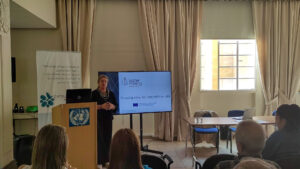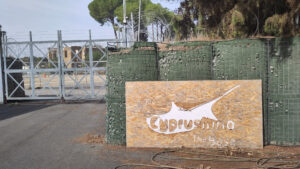07 Nov WATER-MINING project in cross-community Cyprus talks
Ledra Palace Hotel, Nicosia, Cyprus, 26 October 2023.
Our need for sustainable water solutions in the face of climate change is a shared challenge that requires communities to come together at all levels. A case in point can be found in Cyprus, where populations on either side of the north-south divide could find common ground in their efforts to improve the situation in what is one of the most water-scarce nations in Europe.
It was in this spirit that WATER-MINING attended the Water and Energy Sustainability and Waste Management Conference, which gathered representatives and experts from Greek and Turkish Cypriot communities at the Ledra Palace Hotel, situated in the Buffer Zone dividing the territory of the internationally-recognised Republic of Cyprus, an EU member, and the self-proclaimed, internationally unrecognised Turkish Republic of Northern Cyprus.
The two-day conference between 26-27 October 2023 was organised by Professor Frithjof C. Kuepper, Chair in Marine Biodiversity at the University of Aberdeen, a partner of the WATER-MINING project.

WATER-MINING coordinator Patricia Osseweijer speaks at the Nicosia conference
Ahead of the conference, Professor Kuepper said in a press release: “Finding shared solutions to Cyprus’s water scarcity issues is eminently possible, we hope to build on the precedent of Nicosia’s bi-communal wastewater treatment infrastructure to increase island-wide access to facilities such as desalination, as well as a joined-up approach to waste management, recycling, and energy issues.”
WATER-MINING project coordinator, Professor Patricia Osseweijer from the DELFT University of Technology, also addressed the conference alongside representatives of international organisations such as Colin Stewart, the Special Representative of the Secretary General in Cyprus and Head of the UN Peacekeeping Force in Cyprus, and Myrto Zambarta, head of the representation of the European Commission in Cyprus.
“WATER-MINING is in a field where both populations need solutions. The water issue can create a basis for collaboration towards a solution to a problem that shouldn’t exist,” Osseweijer said of the conference.
Osseweijer offered an introduction of the EU-funded WATER-MINING project’s activities and aims of developing energy-efficient technologies for treating wastewater from urban and industrial areas and from desalination, whilst promoting the extraction of valuable products from the residues generated during the process.

A general image of a street in the buffer zone of Nicosia, Cyprus.
She highlighted the importance of understanding local social nuances when rolling out such innovations, stating that emotional concerns cannot always be addressed by facts. Starting with a shared problem can also provide an opportunity for communities to come together.
The event was staged by the Cyprus Peace and Dialogue Center, the Glafkos Clerides Institute, the Next Century Foundation, the European Commission, the European Parliament Office in Cyprus and the University of Aberdeen. It brought together experts in the field of water management, energy and environment from institutions on both sides of the United Nations Buffer Zone.
The Turkish Cypriot population in the northern portion of Cyprus is able to receive water from a pipeline connected to Turkey. The Greek Cypriot majority southern region of the island has in the past turned to Greece in times of drought. Today, the Republic of Cyprus relies on desalination for a large part of its drinking water, but the energy that is used to fuel the process contribute to 2% of the country’s CO2 emissions.
However, sewage and water management have been the focus of bi-communal cooperation for many decades. The Nicosia Wastewater Treatment Plant, funded by the Sewerage Board of Nicosia, and the European Union and facilitated by United Nations Development Programme (UNDP), has been providing treated water to communities on both sides of the divide in Cyprus for decades.
The proliferation of desalination plants threatens to increase environmental damage in coastal areas due to brine discharge, issues that the WATER-MINING project is tackling. One of the six WATER-MINING European pilot studies is located at the Larnaca Wastewater Management Plant in southern Cyprus.
At the plant, they treat the water effluent and provide higher-quality water that can be reused and recovered in the form of valuable products such as sodium chloride and phosphorus. These produce chlorine for water disinfection and fertilizer for agricultural fields respectively.
ABOUT WATERMINING
WATER-MINING is an EU-funded multidisciplinary research project that creates water management solutions using a circular economy approach. The project’s consortium consists of 38 public and private partners and four linked third parties from 12 countries and is led by the Delft University of Technology. WATER-MINING works with pilot sites in Cyprus, Spain, Portugal, Italy, and the Netherlands to demonstrate new and efficient ways to reclaim nutrients, minerals, biopolymers, energy and freshwater from desalination, and industrial and urban wastewater. To successfully integrate these value-added products into resource supply chains, the project produces science-based, market-oriented policy recommendations, designs circular business models, and engages stakeholders, leading to sustainable management of water resources.
FOLLOW & SHARE
https://twitter.com/watermining
https://www.linkedin.com/company/water-mining/
CONTACT
Communication: Nicole Heine; nicole.heine@dechema.de; DECHEMA e.V.
Josep Crous Duran; josep@revolve.media; REVOLVE.
